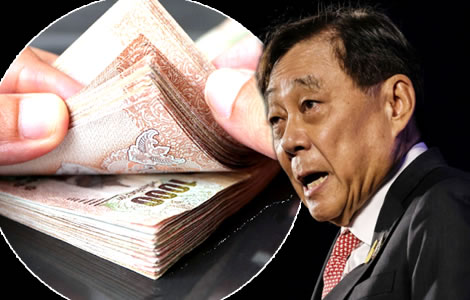Property and manufacturing sectors plummet, access to credit tightens, and economic chiefs warn of worsening conditions. Analysts doubt 2.6% GDP growth for 2024 amid rising household debt and slumping vehicle sales.
There are rising signs that the country’s economic chiefs are finding themselves on a sticky wicket as the property sector and manufacturing continue to head south. In the meantime, access to credit is tightening as the banking sector pulls in its horns. Previously, both the Minister of Finance, Pichai Chunhavajira, and the new Chairman of the National Economic and Social Development Council (NESDC) made it clear that all is not well. Indeed, analysts are beginning to anticipate that even the lacklustre GDP projected growth rate of 2.6% may not be achieved in 2024. In short, Thailand is in the throes of a very tight liquidity crisis.

Following a meeting of the economics cabinet on Tuesday, there were firm indications that the country’s economic outlook is darkening. The meeting came after Minister of Finance Pichai Chunhavajira told reporters that economic growth was slumping.
That was on Wednesday last week.
After that, the newly installed Chairman of the National Economic and Social Development Council (NESDC), Supavud Saicheua, warned that the Bank of Thailand’s economic data and assumptions might be wrong.
In short, Mr Supavud questioned whether stronger growth will come in the third and fourth quarters of 2024.
Grim economic outlook as Growth falls and debt rises to alarming levels. Purchasing power is falling
Indeed, it will be needed as the first quarter of 2024 only saw 1.5% growth. At the same time, even this was ahead of expectations.
On Tuesday, the government’s economic team heard that household debt was ฿16.4 trillion or 90% of GDP.
The ministry examined a figure of ฿13.6 trillion through licensed financial institutions and banks.
Economy in bad shape as the Revenue Department ramps up demands for more taxpayers to pay up
Top Thai insurer says no more new policies for EV cars. Later, it emphasised renewals case by case
Afterwards, reporters were told that at least ฿1 trillion of this amount is confirmed as bad debt. Furthermore, a more significant proportion falls into the Special Mention category.
In short, this means that the loans are in default. Certainly, both principal and interest payments are overdue between 30 to 90 days.
Household Debt crisis deepens with massive loan defaults and steeply declining vehicle sales
Earlier in February, the Bank of Thailand had highlighted a fall in household debt in the opening three months of 2024. In short, it fell only very marginally from 91% to 90.9%.
In the meantime, the central bank has been hoping that stronger GDP growth may alleviate the situation. However, it appears that the current credit crunch and measures taken to rein in borrowing are impeding growth.
Significantly, the sale of new vehicles has cratered in the opening half of 2024. From January to May 2024, they slumped by nearly 24%. So much so, that even the price of second-hand cars has fallen by a massive 40%.
At the same time, the government’s much-vaunted EV car drive has also stalled. Certainly, this is being blamed in the short term on pricing discounts. In other words, steep discounts have caused buyers to postpone decisions.
Nonetheless, sales of EV cars across Western markets have dropped sharply in the last few months. Furthermore, existing EV car owners in large numbers, according to a worldwide McKinsey & Co survey, expressed a mind not to purchase another EV vehicle.
Thailand’s Automotive Industry hit by a perfect storm as collapsing EV sales and credit blocks collide
Meanwhile, Thailand’s automotive industry has been battered by a perfect storm. In brief, the failing subsidised drive for EV cars, the faltering economy and the block on credit imposed by the Bank of Thailand.
A recent decision by Honda to close a second production facility was yet another blow. It followed moves by both Subaru and Suzuki to exit manufacturing in Thailand altogether.
The Thai economy is also being hit severely by industrial dumping from China. This is particularly impacting the country’s steel industry in addition to its small business sector.
Consequently, Thailand has become extremely dependent on foreign tourism.
In turn, while the kingdom will achieve at least a 40% rise in visitor numbers this year, questions are being raised about tourists’ spending. In addition, the Finance Minister’s hope of reaching 37 million arrivals looks unlikely to be achieved.
At length, the kingdom will reach something like 35 million visitors this year.
Property Market in free fall as foreign buyers dwindle in Bangkok and GDP growth is revised down
Simultaneously, the kingdom’s property development business has gone into free fall in the second quarter of 2024.
A key impediment was a drought in buyers from Russia and China in the kingdom’s top market, Bangkok. At the same time, the Myanmar junta shut off capital outflows to Thailand.
This has been a key market propping up sales, particularly at the luxury end in the capital.
Myanmar Junta meltdown threatens to end Bangkok’s condominium sales boom as Kyat currency fails
Meanwhile, analysts are beginning to mark down the Bank of Thailand’s projected growth rate of 2.6% this year.
Presently, we are still awaiting the GDP growth rate for Quarter Two of 2024. This is expected sometime in August.
However, the comments by the Chairman of the National Economic and Social Development Council (NESDC), the body responsible for measuring Thailand’s GDP, appear ominous.
Household Debt and lacklustre GDP output dominated Tuesday’s discussions at the Economy cabinet meeting
Meanwhile, at Tuesday’s meeting, the minister and economic heads focused on household debt. Undoubtedly, it is a key impediment.
Last week, even Minister of Finance Pichai accepted that Thailand’s growth prospects are being stunted by too much debt in the system.
Simultaneously, manufacturing output dropped again in May. This came after a brief pickup in April driven by short-term demand.
A measure agreed upon by the government and announced by Deputy Minister of Finance Paophum Rojanasakul is a ฿100 billion fund for cheap loans. In effect, the Government Savings Bank will loan money to the banking sector at a loss. In fact, a lending rate of 0.01%.
On Tuesday, Minister Paophum suggested that this funding was aimed at vulnerable SMEs or small business concerns. However, there are reports that ฿65 million of this is being directed to property development firms.
Digital Wallet giveaway plan sparks concern among oversight agencies as government pushes forward
Notwithstanding this turmoil, the government is pushing forward with its controversial Digital Wallet ฿500 billion public giveaway.
Many analysts are ill at ease about the plan. Not least the Bank of Thailand, which has urged the government to scale it down.
It is aimed at giving a digital credit of ฿10,000 to all Thai adults below a certain income threshold and those without access to significant savings.
In short, the government is now funding this from its annual budget. ฿122 billion is being taken from its 2024 budget and ฿152 billion from its 2025 budget. In the meantime, it is assumed that only 42 million people will register for the programme.
Not only has the Bank of Thailand expressed its reservations, but so has the National Anti-Corruption Commission (NACC).
Wider Economic concerns grow as Credit access and Liquidity remain major issues and perhaps a threat
Despite this, there is growing concern about the wider economic picture. In particular, the lack of access to credit and a dearth of liquidity in the Thai financial system.
On Tuesday, measures to address this further included the extension of loan facilities and repayment periods to older borrowers. For instance, the current range of 60-70 years is to be extended to 85.
At the same time, banks are being asked to lower repayment amounts.
In addition, credit card companies are to be asked to lower the minimum repayment rates to 5%. Only recently, the Bank of Thailand raised this back to 8% after the pandemic emergency was deemed over.
In summary, the Thai economy is in a chronic state of crisis. All eyes must now await growth rates for Quarter Two and later Quarter Three. The fear is that the economy may be running out of steam and liquidity.
Join the Thai News forum, follow Thai Examiner on Facebook here
Receive all our stories as they come out on Telegram here
Follow Thai Examiner here
Further reading:
New tax era in Thailand begins as Revenue now shares data with 138 countries within the OECD
Calls for clarification of new Tax regime which appears to target expat foreign income sources
10 year visa a magnet for global citizens setting up in Thailand with zero tax on offshore income
Wealthy foreigners to own small landholdings associated with homes here agreed in principle
New plan for the Thai economy could see an elite foreign visa scheme generate up to 6% of GDP
Economic plan to put the smile back in Thailand’s appeal to western foreigners to live and work
IMF urges government to loosen nation’s purse strings as finances tighten with the tax take down
Plan to allow high tech and skilled foreigners to live and work in Thailand for up to four years


















